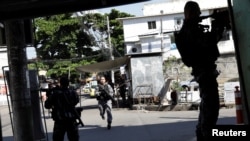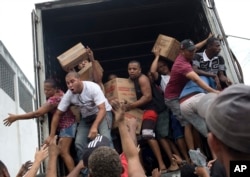Amnesty International on Thursday warned of growing violence across Brazil, particularly killings by police as law enforcement and criminals battle over turf in Rio de Janeiro, the country's second-biggest city.
In a report to the United Nations, which periodically monitors violence in conflict zones and other troubled areas worldwide, the human rights group highlighted the recent spike in killings by Rio police — 182 in the first two months of the year, or 78 percent more than a year earlier.
“Brazil has not taken enough steps to tackle the shocking levels of human rights violations across the country, including soaring police homicide rates,” Jurema Werneck, Amnesty's director in Brazil, said in a statement.
Crime on the rise after budget cuts
The criticism comes as public security forces, grappling with budget cuts after two years of recession in Latin America's biggest country, also contend with rebounding crime.
In Rio, where the state government last year slashed the public security budget by more than a third, criminal gangs are battling for lucrative access to drug routes and sales points.
Gangs are also fighting to take back turf that police had occupied in the runup to the 2014 World Cup and the 2016 Olympics, both of which Rio hosted.
Clashes between police and criminals in recent months have led to prolonged firefights and multiple deaths — in slums and rich neighborhoods alike. Earlier this week, criminals torched buses and a truck in Rio's outskirts, crippling traffic after a police raid.
Authorities have long recognized abuses among law enforcement but had in recent years successfully cut down on police violence.
“Respect for human rights is enshrined in Brazilian law,” General Carlos Alberto Santos Cruz, national secretary for public security, told reporters in Rio on Thursday. “When you train someone in public security the principal of respect for human rights is fundamental.”
Dozens of guns seized by police
Security and human rights experts, however, say Brazil falls far short of those principles.
After police apprehended dozens of large-caliber guns following the raid this week, law enforcement hailed the seizure as a great success. But many are troubled that the guns, and the violent backdrop to the seizures, exist to begin with.
“Maybe that sort of seizure is a good thing in a war zone or a country of great instability,” said Paulo Storani, a former police commander who now is a security consultant. “But here it reflects a failure of government and policy.”






